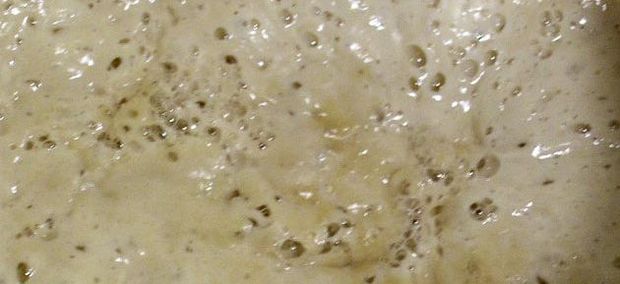This Way Up for Saturday 31 May 2014
The science of sourdough
The idea of fermentation, using bacteria and yeast to transform our food has been around for millennia. We started farming 100,000 years ago; from hunter gatherer to farmer, suddenly we had seasonal crops that led to surplus foods at harvest time. Some of it spoiled, rotted or went mouldy, but some bright spark realised that this ‘rot’ can actually make food taste better and is a great way to preserve some foods too.
Fast forward to today and many of the foods we enjoy rely on this natural ‘rotting’ (fermentation) process of micro-organisms looking for energy so they can reproduce. To think all this is happening on your salami, in your soy sauce and beer, your wine and cheese and of course in your sourdough bread!
What’s actually happening in the floury gloop that we call a sourdough starter? It’s a complex system, a living community of lactic acid bacteria and yeast that we’re only just beginning to understand. The bacteria eat carbohydrate and excrete acid, which lower the pH level keeping other bacteria away. Meanwhile the yeast tolerates an acidic environment nicely, and the yeast excretes carbon dioxide that helps the bread rise.
Where does most of the micro flora come from? What has the biggest impact on your sourdough community, the flour, the water or the wild microbes in your home? Listen to This Way Up on Saturday to find out.
Links
- Microbial ecology of sourdough fermentations: diverse or uniform? Research Group of Industrial Microbiology and Food Biotechnology
- Could 100-year-old sourdough be a myth? BBC Food
- Could home fermenting catch on? The Guardian

A sourdough starter fermenting.
Dog poo detectives
Ashifa Kassam lives and works in Spain where defecating dogs, and their owners, are being tracked by detectives. Also Madrid introduces new smart parking meters that will charge polluting cars more for parking.
Birds: Paradise Duck
Although it's duck hunting season, no shots get fired and no Paradise Ducks get harmed as Hugh Robertson and I find a pair of "paris".
Apple Beats and scams
Our tech correspondent Peter Griffin with the latest tech news. This week, Apple users on both sides of the Tasman are targeted in a scam. Also Apple shells out US$3 billion for Dr Dre's headphone business.
Self-help guide post-apocalypse
Lewis Dartnell is an astrobiologist searching for life on Mars. His book 'The Knowledge' is a self-help book for life in a post-apocalyptic world. It claims to tell you everything you need to know about rebuilding civilisation from scratch- and it's only 289 pages long!
DuckDuckGo: private search engine
DuckDuckGo is turning the traditional online search model on its head with anonymised search results designed to protect your privacy. We're speaking to DuckDuckGo's founder Gabriel Weinberg.